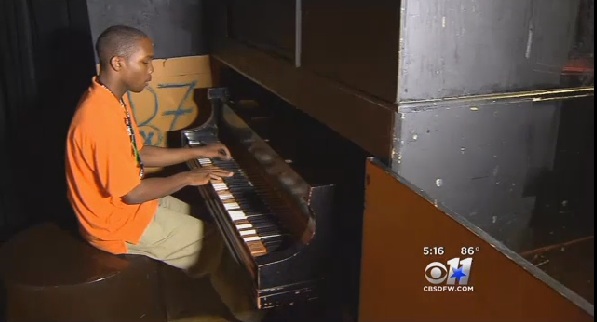Listening to classical sounds on music station WRR-FM 101.1 and the different types of instrumentation coming through the airwaves sculpted Quinn Mason, a recent graduate at North Dallas High School, into the accomplished musician he is today.
“The variance in beats and soundscape of live instruments (on WRR-FM) is what intrigued me the most from the other stations, ” he said.
For Mason, the realization to compose great arrangements came at age 9.
This year, he was one of six students nationwide to win the American Composers Forum (ACF) NextNotes High School Composition Award. His piece is entitled Masonian Rondo for brass quartet. Recipients of the award receive a $1,000 scholarship toward composition lessons.
“I believe by winning this award it’ll be beneficial to my career, “Mason casually said. “I was able to link up with my peers in the music industry and made some great connections.”
Also of note, Mason plays seven instruments.
Whether formally trained, or through self-taught videos from YouTube, Mason is a musician at his core. He found his ability in the musical hall of Onesimo Hernandez Elementary School during a required music course. There he found his way to his first instrument, piano.
“I went in eager, and let my curiosity take me away,” Mason proudly recalls of that time.
By the time he reached his senior year in high school, the list grew to cello, clarinet, trombone, obo percussion, even the recorder.
The 19-year-old graduate says music is a way to tap in to his inner self. What many may not know is Mason is a teenager with autism.
The type of autism Mason says he is diagnosed with is known as Asperger syndrome. People identified with this type of disorder may experience an imbalance in social interaction and other types of communication. Mason uses music as his voice to speak, nonverbally.
“The best thing about me is I can express myself. It’s the way I can speak to others,” he says with confidence.
As he scales back his conversation on his disorder, it’s a stark comparison to the excitement behind his voice he once had describing some of the “greats” in classical music.
For example, when asked about Frédéric Chopin’s musical ability, Mason shared his views of the composer.
“He’s an essential favorite of mine,” he said. “I even know how to play some of his pieces. But orchestra was not his thing.”
Mason later admitted that some of Chopin’s compositions were “very boring,” citing his placement of whole versus half notes.
To the untrained ear, Chopin’s work may be deemed as the pinnacle for composers during the Romantic era. But for Mason, he found his interest peeked with Peter Tchaikovsky (known for composing The Nutcracker, Swan Lake and The Sleeping Beauty).
Mason explains his appreciation for composition, which ultimately led him to receive the ACF award, was in part to hearing a Tchaikovsky piece.
“When I heard Symphony No. 6, I learned exactly what orchestra was capable of,”
Mason said. “His arrangements were emotional, as he was a romantic composer. He was autobiographical.”
Similar to Tchaikovsky, Mason’s submission was telling of who he is. The Masonian Rondo can be described as a fun, abstract piece that pulls out portions of Mason’s personality.
In May, Mason premiered his composition for the Dallas Opera at the Winspear Opera House.
This fall Mason will begin a new story to compose: college. He will attend Richmond College before he plans to transfer to the University of North Texas. But he won’t stop his efforts there. Ultimately, Mason has his sights set on The Julliard School for graduate studies.
As he stretches toward his future as a professional composer and musician, Quinn is set to tackle “lots of writing, making connections and giving composition life.”
Photo courtesy CBS DFW

